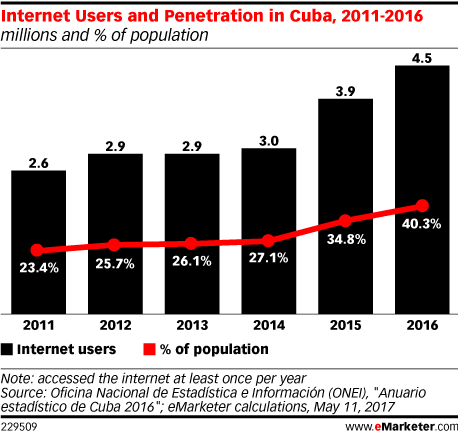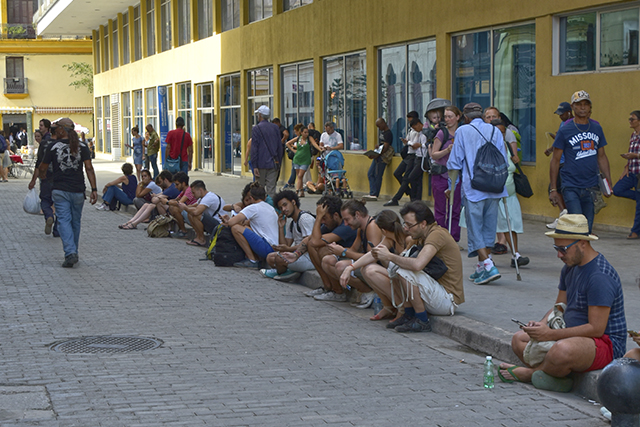What’s the real status of Internet access in Cuba?
by Matteo Ceurvels of eMarketer (edited with Notes by Alan J Weissberger)
Few people in Cuba have regular access to the Internet, and those who do encounter slow download speeds, according to an eMarketer study. Although Cuba’s state-run service provider (see details below) has built WiFi hotspots throughout the country, the relatively high rate of $1.50 an hour is too much for most Cubans to pay. [Please see references below for additional information on the WiFi hotspots in Cuba- mostly in Havana]
eMarketer estimates that there will be 360.4 million internet users in Latin America in 2017. While the market research firm does not break out specific metrics for Cuba, the latest figures from the government’s National Office of Statistics and Information (ONEI) show that over 4.5 million people, or roughly 40.3% of the total population, accessed the Internet at least once during 2016.
…………………………………………………………………………………………………………..
Editor’s Note: The actual ONEI ICT report (via Google Translate) states that for 2016 there were 403 people that accessed the Internet out of every 1,000 people living on the island. That compares with 348, 271, 261, 257 and 232 people for the years 2015, 2014, 2013, 2012, 2011, respectively.
The same report (which I don’t trust) says the mobile population coverage (not usage) has been 85.3% of the population from 2012-2016, up from 83.7% in 2011.
…………………………………………………………………………………………………..

The number of people with internet access in their homes was significantly lower: The BBC reported in March of last year that the at-home internet penetration rate was roughly 5%.

Web access in the country remains relegated to a few options. State-run telecom Empresa de Telecomunicaciones de Cuba S.A. (ETECSA), which first began offering public Wi-Fi spots in 2015, claims to provide 391 such spots across the country. But at a cost of about $1.50 per hour, access remains too expensive for most Cubans, and internet speeds are reportedly excruciatingly slow.
ETECSA also began a pilot program in December of last year to provide some 2,000 users in Havana, Cuba’s capital, with fixed broadband internet access for a free two-month trial period. In March, ETECSA said 358 participants in the program signed up to pay for the service, which offered data speeds of between 128 kilobits per second (Kbps) and 2 megabits per second (Mbps).
And when residents of the country do manage to get online, they are subject to strict internet censorship overseen by the government. Some websites and services are blocked, and communications can easily be monitored by government figures.
During parliamentary sessions held in July, Vice President Miguel Díaz-Canel acknowledged that Cuba has one of the lowest internet access rates, but rejected the notion that its society was “fully disconnected.”
He added that tech companies that had entered into agreements with the country’s government to provide them with the infrastructure necessary to expand internet access had been met with “fierce financial prosecution.”
Despite these claims, the government has sought out partnerships with some of the world’s leading tech companies. In April, Google brought servers in the country online for the first time, making it the first foreign tech firm to host its own content in Cuba.
At the parliamentary sessions, Díaz-Canel also claimed that the penetration of social media platforms had grown by 346% in 2016. (The government did not respond to eMarketer’s request to verify this figure.)
However, Martín Utreras, vice president of forecasting at eMarketer, noted that the majority of social media users in the country were most likely foreign tourists looking to stay connected while on vacation.
According to data from StatCounter, there are signs that Facebook is a leading social media platform in the country. Facebook was responsible for 83.3% of page views resulting from social network referrals in Cuba in July, more than either Pinterest (8.4%) or Twitter (4.3%). (StatCounter’s figures take into consideration website referral traffic from both locals and visitors in Cuba.)
Despite signs that internet access is increasing in the country, Cuba still has a long way to go before getting online is something residents consider normal. In fact, many in the country rely on “el paquete semanal,” or the weekly package—a hard drive that is loaded with contraband content such as news, music, TV shows and other videos and passed from person to person.
“Cuba’s journey resembles that of similar trends we’ve seen in the case of China or Vietnam,” Utreras said. “Although Cuba is still many years behind in terms of private telecom investment, infrastructure development and overall internet adoption, by comparison, the immediate future will most likely be driven by government interests rather than the market itself.”

……………………………………………………………………………………………..
References:
https://www.emarketer.com/Article/Cuba-on-Slow-Crawl-Toward-Increased-Internet-Access/1016352
http://www.one.cu/aec2016/17%20Tecnologias%20de%20la%20Informacion.pdf
http://www.businessinsider.com/is-there-internet-in-cuba-2017-1
https://insightcuba.com/blog/2017/03/05/havanas-wifi-hotspots-and-getting-online-cuba
Cuba to expand Internet access and lower price of WiFi connections
8 thoughts on “What’s the real status of Internet access in Cuba?”
Comments are closed.




Excellent summary of the state of Internet affairs in Cuba.
Salary of most Cubans is $20 per month. Unless there is a huge subsidy to lower Internet usage charges it is difficult to believe there will be any meaningful increase in the general public’s usage.
More free WiFi hot spots, especially outside of Havana, would also increase Internet usage on the island.
Excellent article on the true status of Internet access in Cuba… you provided all the information which anyone could want. Now days, it seems like the Internet is most important thing in life. People can live without food but without the Internet they can not. Thank you for sharing this information with us.
We are the only company providing high speed packet WiFi internet in Cuba. It’s not cheap, but it works great. Please see https://www.cellomobile.com… for more information.
Many thanks & have a great time in Cuba!
ETECSA had started a pilot test of the Mobile Internet service. It will be free of charge for clients of prepaid mobile telephony.
Clients must have the APN Nauta configured and activate the data use on their cell phones.
Some users commented that the speed is equivalent to a 2G connection of some countries outside Cuba.
For access to the internet on cell phones it is essential to have 3G technology, which started functioning in Cuba in 2017 and currently is available in Havana and each province’s principal cities, as well as in the tourist destinations to the north of the island (Varadero, Villa Clara and Ciego de Avila keys), according to ETECSA.
The internet service on mobiles has been announced for a long time by the company, but up to now it is not known when it will be established for all clients or what the rates will be.
“For clients to enjoy this technology they must first have a 3G coverage and their cell phone’s terminal must be compatible with the WCDMA standard in the 900 MHz frequency, which is an international norm used by several countries in Europe and Latin America,” ETECSA has recognized.
In Cuba there are a total of 6.5 million telephone lines, of which more than 5 million are cell phones. Meanwhile, of these more than a million use the Nauta email service.
https://oncubamagazine.com/news/etecsa-starts-pilot-test-for-internet-on-cell-phones/
Don’t hold your breath! On March 28, 2019, Google signed a memorandum with Cuba’s telecom monopoly ETECSA to create a cost-free connection between the two networks. Doing so will boost Cuba’s internet speeds, but this peering agreement comes with a catch. Cuba will first need to install a new undersea fiber-optic cable to physically connect its network with a Google “point of presence.” And that could take years.
Once the fiber optic cable is in place, Cuban citizens will have faster access to content hosted on Google servers, and the Cuban government will see cost savings. At the moment, ETECSA must pay third-party fees for passing traffic to sites like YouTube, Google Maps and Google.com.
Google and Cuba have a history of collaboration. Even before US-Cuba relations improved, Google made Chrome freely available throughout the country. In 2016, Obama touted Google’s plans to bring internet to Cuba. Shortly after, Google installed local servers to speed up its services, and in 2017, Google became the first foreign internet company to go live on the island.
Considering that Cuba first tested home internet in 2016 and just launched mobile internet nationwide last summer, the country has come a long way in a relatively short span. While there’s no proposed timeline for the new fiber optic cable, this agreement does establish a team of engineers to sort through the necessary details and get the project started.
https://www.engadget.com/2019/03/28/google-cuba-faster-internet-agreement/
Don’t hold your breath! On March 28, 2019, Google signed a memorandum with Cuba’s telecom monopoly ETECSA to create a cost-free connection between the two networks. Doing so will boost Cuba’s internet speeds, but this peering agreement comes with a catch. Cuba will first need to install a new undersea fiber-optic cable to physically connect its network with a Google “point of presence.” And that could take years.
Once the fiber optic cable is in place, Cuban citizens will have faster access to content hosted on Google servers, and the Cuban government will see cost savings. At the moment, ETECSA must pay third-party fees for passing traffic to sites like YouTube, Google Maps and Google.com.
Google and Cuba have a history of collaboration. Even before US-Cuba relations improved, Google made Chrome freely available throughout the country. In 2016, Obama touted Google’s plans to bring internet to Cuba. Shortly after, Google installed local servers to speed up its services, and in 2017, Google became the first foreign internet company to go live on the island.
Considering that Cuba first tested home internet in 2016 and just launched mobile internet nationwide last summer, the country has come a long way in a relatively short span. While there’s no proposed timeline for the new fiber optic cable, this agreement does establish a team of engineers to sort through the necessary details and get the project started.
https://www.engadget.com/2019/03/28/google-cuba-faster-internet-agreement/
It’s hard to say because news from Cuba is controlled by the government so we probably can’t accurately assess the truth of Internet in Cuba.
On July 29, 2019, Cuba legalized private WiFi in homes and businesses, although one must obtain a permit to have access.
Here’s an example of Cuba government rhetoric/propaganda:
“Cubans support and defend the revolution in every domain, both in the real and the virtual worlds,” Ernesto Rodriguez Hernandez, vice minister of communications, said in an interview.
https://www.euronews.com/2019/07/29/cubans-now-allowed-to-access-the-internet-from-their-own-homes-but-at-what-price
The world is changing and if Cuba wants to participate the country needs both mobile and fixed line broadband Internet access.